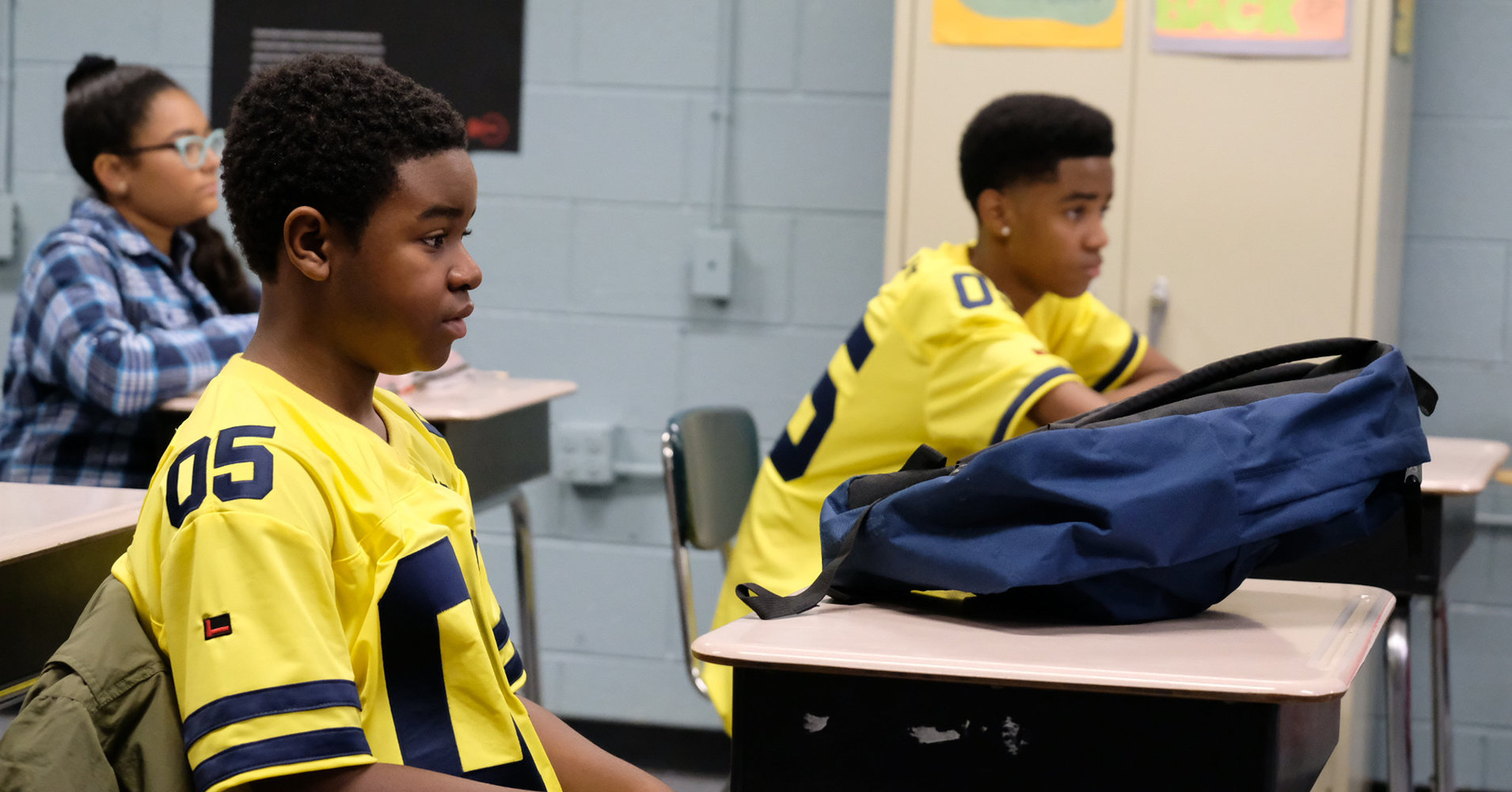[ad_1]
A peek into Earn’s childhood explains why he is the most flawed character of “Atlanta.”
Warning: This recap includes discussion of suicide.
The latest episode in the series’ second season, “FUBU,” follows a pivotal day in young Earn’s life, opening on a scene at Marshalls with his mom. He convinces her to buy a questionably discounted yellow FUBU jersey, because name brand is everything. Eager to stunt on his classmates at his middle school, young Earn shows up the next day ready to gain the validation and status that he’s presumably never experienced prior.
His fly aspirations come to a screeching halt, however, when another boy in his class, Devin, arrives in a FUBU shirt that looks very similar to his, but isn’t quite the same. Their peers note the differences ― Earn’s has two stripes with no patch, Devin’s has one stripe with a patch ― and determine that one is fake. The quest to find out which commences, spanning the entire school day, as Earn tries to dodge “FEBE” jokes from other kids and heed his cousin’s advice: to just be confident in himself. Eventually, Al swoops in — as he still does in the present — to save the day, convincing the other kids that Earn’s shirt is real and Devin’s is fake.
What Earn didn’t know is that Devin needed this win much more than he did. After being bullied by some older teens and experiencing issues at home, Devin killed himself. Earn and Al’s moms learn of the news and tell the boys to look after each other, right after reminding them that what a black man in America wears matters.
Robbin’ Season has repeatedly highlighted how much we value materialistic things. Yet, in the pursuit of money or status, every one of the show’s major characters has lost something greater — something that actually matters. On this week’s ‘Run That Back,’ Julia Craven and Taryn Finley examine true highway robbery, the relationship between black people and our clothes, black kids’ mental health and how Earn has yet to learn from the lessons life tried to teach him as a child.
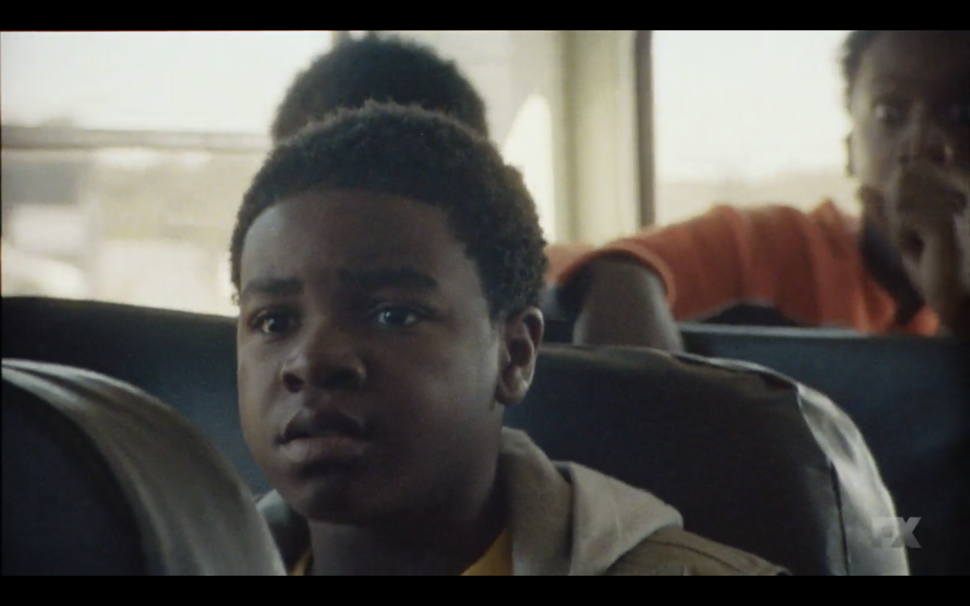
Earn is running around in Marshalls when he comes across a FUBU jersey, the ultimate symbol of black excellence throughout the ’90s and into the early 2000s. His mother agrees to buy the shirt for him, and he’s so excited to wear it the next day that he can’t sleep. He wakes up before his alarm and dashes to the bus stop. Earn has always had a deep desire to stunt, but it’s clearer than ever emanating from his timid middle-schooler self. On the bus ride, a kid attempts to throw a cup of yogurt out the bus window, but it ends up smacking a classmate seated further back in the face. The yogurt-faced kid punches the yogurt thrower so hard that his head hits the bus window. The moment — and the timely camera pan to Earn’s face — provides a glimpse into how routine violence will take a darker turn later in the show.
Taryn: So. The fresh az I’m iz episode was a lot.
Julia: Yeah, it was in a number of ways. Mainly, I am quite triggered by how accurately it displayed middle school. I was teased a lot ― as many of us were ― over the littlest things, so it brought back a lot of memories of things I’ve grown past. (Kids are awful. I get it. I let it go lmao.)
Taryn: Yeah, it was very triggering in a way that brought up old shit on a personal level. Middle school is already rough, but for black kids it can be excruciating on a lot of levels. And if you don’t heal, that shit will turn you into adult Earn. But unlike adult Earn, my heart went out to young Earn. He didn’t really want the FUBU shirt he asked his mom to buy him while they were in Marshalls. He wanted what the shirt represented and the clout it would give him in school. Which is normal for a kid.
I loved his mom’s reaction when he asked her to buy it. “It better not have no craziness on it,” while looking everywhere but at the shirt in Earn’s hand lmao.
Julia: I, too, felt for Young Earn. I don’t place any blame on any of the kids in this episode ― something a number of the reviews have grossly done ― because they’re children who are dealing with their own shit and they don’t understand how to not project that onto people. But the way Young Earn’s face lit up when he saw that FUBU jersey was very symbolic of how we learn to thirst after status symbols at a young age. We want the status. We want to be cool. I remember I was 8 and I was trying to be cool (I failed like shit lmao). I walked by this girl and she said, “Julia tries so hard to be cool but shakes head.” Now when I think about it, and after seeing this episode, I wonder why I gave a fuck.
Taryn: I hate that so much and speaks to how quickly we adultify black kids. Ugh!
Julia: And that head shake now as a grown woman is pretty fucking funny. She was sad about my failure to be dope and I get it lmao. I was whack!
Taryn: That was most of us. I think that’s why they showed all those other black kids in the store at the beginning. Trips to those discount stores were routine. I remember begging my mom for Baby Phat jeans at Marshalls way back when layaway was a way of life. We struggled financially, but clothes have played such an important role for us in a way that speaks to the larger societal obstacles we have to overcome.
That’s why Earn was so geeked to get to school the next day. You know his mama would’ve had to come pull his ass outta bed any other day. Earn’s always had aspirations to stunt on niggas and he thought he would finally get that day with this FUBU shirt.
Julia: Right. For black people, clothing is so important. How we present ourselves to the world is one way we have of feeling great, feeling powerful. And, at times, many of us like to believe that it can help counter the racism we receive. (IT CAN’T, SO TO READERS WHO WANNA POP OFF ABOUT THIS, DON’T EVEN TRY IT.) Maybe it can change the perceptions of us. Clothing is a way to hide pain and express oneself. This is something black people got on lock. It’s one source of pride in a world that hates us, a world that demonizes our fashion. But still we stunt.
Taryn: Word. And the role fashion plays is still vital as an adult. We see that when Earn’s mom is talking to him about wearing a suit to his piano recital in the last scene. “You are a black man in America. When you meet people, you need to look good. Your clothes are important.” We’ve all heard a version of that from our parents before.
It’s one of the first forms of respectability politics that we’re taught to use as a shield to protect us. Time and time again, though, we see that shit doesn’t always matter, as you said. This is why I hate the “Jordans vs. passports” debate every time it pops up on Black Twitter. It ignores that and feels very removed from what’s real ― to say getting a passport is more valuable than getting a fresh pair of J’s for all black people. But that’s a whole other conversation.
Julia: Sis, I’ve had “passport” muted since Amanda Seales went off about it and then blocked me on Twitter when I came after her about it. Also Jordans are cheaper and more cost-effective. You don’t need to travel. You need shoes.
Taryn: LMAO. I forgot she blocked you. Damn. Yeah, death to that debate. It’s elitist af.
Is it bad that 13-year-old me would probably beat somebody ass on the bus if they threw their yogurt out the window and it landed on me, too?
I’m lying, I was soft as Earn. But I was smarter than his dumb-intelligent ass. I’ll throw hands at the tender age of 26, though.
Julia: Oh, middle school me would have beat ass over that. This chat is revealing so much about me to the world. But as a middle schooler, moments like that are more about pride and demanding respect than they are about doing the right thing — whatever the “right” thing is in a situation like that.
Taryn: And that’s OK. Vulnerability is healing, so I’m told. I ain’t tried it yet, though.
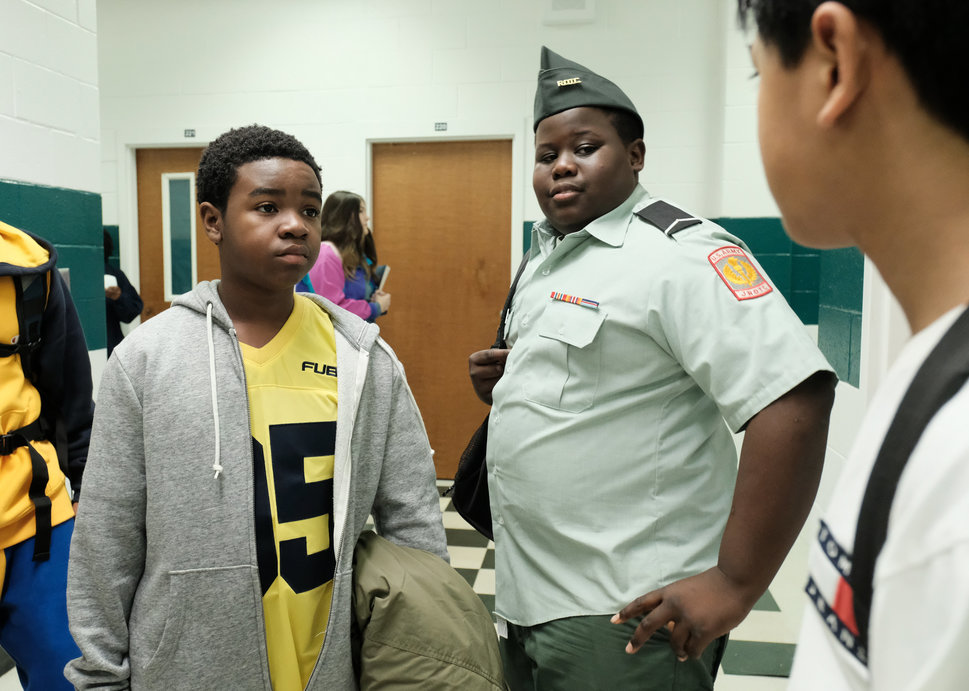
Despite the bus incident, Earn arrives at school feeling good about himself and his FUBU jersey. He’s gliding through his morning until first period when he encounters Devin, who has on a similar-yet-different FUBU jersey. The kids in class pick up on the difference with one lamenting, “Yoooo, niggas wearing fake FUBU now?” Earn expresses his concerns to a white classmate who doesn’t understand what the big deal is — a clear nod to how black and white people move through the same spaces in remarkably different ways. Looking for true guidance, he finds Alfred, who is stealing from someone’s locker. Young Paper Boi tells Earn to be confident in himself and just say the shirt is real. Flash forward to the end of the day, and Earn is surrounded by teens — including Johnny Lee, a teen who is the deciding factor in what’s fake and what isn’t. Lee says the jersey is fake. Earn is faced with a decision: He can apply Paper Boi’s knowledge or own up to the fact that his jersey likely isn’t authentic. Instead, Paper Boi swoops in, declares Earn is in the real jersey and allows his lil cuzzo to come out victorious. Earn runs onto the bus, probably in fear of being found out, and watches as Devin is mercilessly bullied. The next day, the principal tells Earn’s class that Devin dies by suicide.
Julia: Aight so we get to school and Earn is funky fresh, dressed to impress, ready to party. And we see that Earn and Devin have on the same jersey. Now I’m gonna say Earn’s is fake. I never owned a FUBU jersey, but I saw enough of them in Lexington to know that it definitely has a logo patch in the upper right corner.
Taryn: Chile, he thought he was doing it, OK! He took off that sweater ready to stunt.
Julia: Sis was stuntin like shit.
Taryn: So let me let you in on a lil secret. Come close so I can whisper.
Both of them shits was fake, sis.
Real FUBU jerseys have the patch AND the double stripe on the arm.
Taryn: Marshalls knock-offs like shit. Even though Marshalls does have real name-brand shit and I will forever be a customer. Don’t sleep.
Julia: I, too, would have been wearing FEBE.
Taryn: Shit, I wouldn’t be surprised if some of my shit was FEBE. I’m actually about to bring FEBE back. FEBE jersey dresses all summer 2018.
Julia: Fight me. Please. PLEASE!
Julia: falls to ground, presses charges ?
Taryn: bfifhiudgbfrjkf. I guess I’m going to jail in my FEBE then.
Julia: But one thing this season has done is make a lot of comments on what we value as a society and, specifically, as black people. A lot of emphasis is placed on the materialistic in America, and it’s jarring that that isn’t what people have been robbed of this season. In the pursuit of the materialistic, everyone has been robbed of something greater, something that actually matters. The best example is Earn. In the pursuit of money and status, he’s lost his relationships with Van and Al. He’s lost his job. He’s on probation so he’s lost his freedom. He’s lost everything. And the most recent example, Devin’s suicide, is the most concrete example of loss thus far. It speaks to what you can lose when you place too much in things that don’t matter.
Taryn: Right. It’s like this season is the Glover brothers’ “wake up” moment, a la Spike Lee’s “School Daze.”
I think it was important for Earn’s episode to date back to childhood because we’re starting to see the roots of where a lot of this started. The series of events in this episode was a pivotal moment in Earn’s lifetime that still, clearly, has an impact today. It’s kinda like he’s still stuck in the mental space he was in as a child.
I think one of the most telling moments ― not just in regard to Earn but also our relationship to fashion and appearance ― is Earn’s interaction with his white classmate. He’s telling him about his FUBU or FEBE dilemma and the white boy is lost as to why it’s even an issue. “I don’t see the big deal. I’ve worn this shirt twice this week,” he told Earn. That spoke so many volumes. The white boy can wear damn near whatever and no one will bat an eyelid, because white people don’t have to use clothes as metaphoric defensive mechanisms or tools for advancement. They just wear them. We many not always recognize that as a privilege but it is. Our identity is so intertwined with everything we do that we can’t just wear the same thing twice in one week and not get judged by the world. (I mean I do now, but I’m grown and pay my own damn bills and I wish a bitch would say something. Thirteen-year-old Taryn couldn’t.)
Julia: AMEN! Also he didn’t know what bootleg meant and my black ass was appalled.
Taryn: Sis, I thought everybody knew what bootleg meant. And he in the South, so what’s really good?
Julia: It is definitely an episode about mental health and how certain inherited norms hurt us and then follow us into adulthood. Devin’s suicide was a part of the story line that made sense, probably more than anything has this season. I wasn’t shocked that a bullied kid killed himself. That is sadly very common, especially among black children. What got to me was what this says about Earn and his complete lack of evolution. He’s seen the extreme. The materialistic things he cares so much about as an adult have pushed people to suicide. Yet, Earn’s lust for things hasn’t tempered or been put into perspective. Earn has lost every contest he’s been in this season. Tracy beat his ass. Van beat his ass at Ping-Pong. Michael Vick dusted his ass in the Onyx parking lot. And the one time he wins, he sees how fatal it can literally be to win a stuntin’ contest.
Now, I don’t want to say that being materialistic is bad, because I’m prolly gonna hit the Nike store once we finish up this chat. But something about Earn the adult and this incident shows me that he hasn’t developed or grown from this. He’s stuck here. He’s still trying to stunt. He seems high yet broken off that one win. And I want to say I understand it, but I don’t. I’ve also never been in this particular situation. But I wonder what that says about him and our society.
Taryn: As much as I love to drag Earn, I’m gonna play devil’s advocate for a second. I can kind of see why this character flaw followed him into adulthood. It was really disturbing to me how divested the adults in this episode were in checking in on not just Earn but all the kids in Devin’s class to help them process his suicide and move to a place of healing. The principal made an announcement to the class about Devin’s death and the teacher started class right after without skipping a beat. Sure, they had permission to leave class to talk to a counselor ― whose office they probably associate with disciplinary action ― but rarely do schools give black kids the option to ask for help outside of curriculum work. As we saw more blatantly in the “Woods” episode, what you don’t heal from can haunt you for life. Adult Earn may not know it, but he is stuck in this very traumatic moment he played a part in as a child.
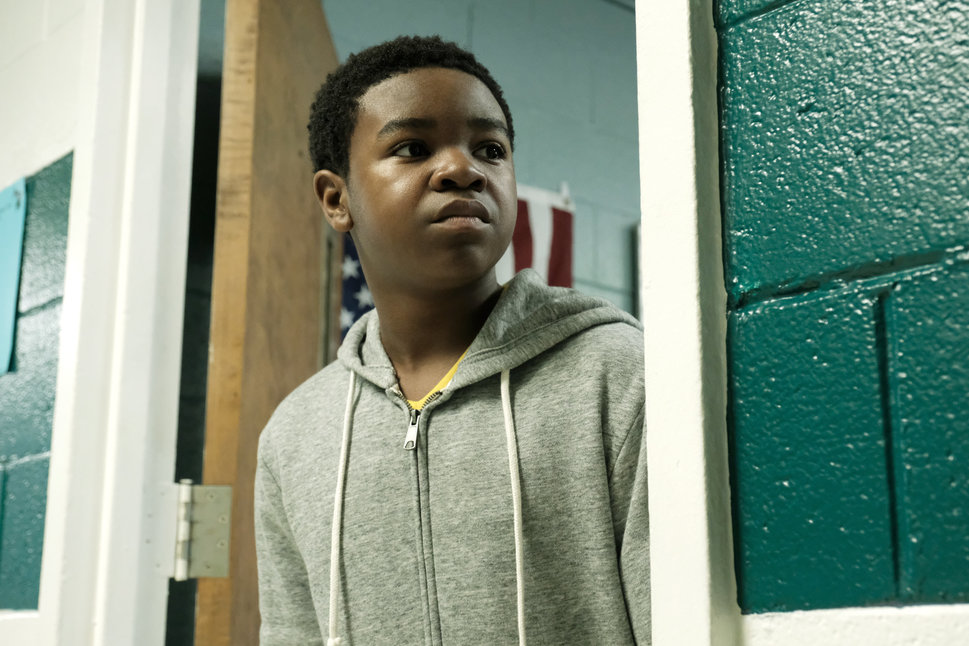
Julia: I 100 percent understand that. But, the dreaded but … while I see how it could have followed him, I have a hard time letting him off the hook for all the further abuse he has caused. This episode provides a lot of rich context, but Earn is a grown man who knows right from wrong. I can’t feel sorry for him as an adult. As a child, absolutely. But I think our society ― and I know this isn’t what you’re doing ― gives men too much time to grow. Those boys in the episode were never truly checked on their behavior. They were yelled at, which is exemplary of a bigger issue with schooling black kids. But I think about Daneisha, who was singled out over having her head down, and how black girls don’t get to be visibly affected by their trauma. And maybe I’m halo-reaching or super sour on Earn, but I don’t see it for him carrying this this heavily as a grown man.
I also think about Devin, who needed this win. Badly. And when he didn’t get it, when he was teased for crying about being bullied, for crying about everything else, he committed suicide. And now Earn, who is understandably traumatized, still hasn’t done the work required to move forward. Come on. I can’t rock with him.
TL;DR ― Fuck Adult Earn SZN. As for Paper Boi, his issue (the toxic relationship with Earn) is still in his life, so “Woods” made more sense to me.
Taryn: All very true. Earn needs to take accountability ― and to see a therapist. He’s too old for the shit he’s pulling.
My heart especially went out for Daneisha, poor baby. Do you know how many black girls I shared a class with were carrying the weight of the world on their shoulders and the only way they could express their pain was “my head hurt” and they still were publicly chastised by the teacher for it. Shit, I’ve been that girl. Going back to clothes for just a second, that’s why Daneisha wore her coat in class. That, too, was meant to serve as a defense mechanism, in a way that becomes more layered as we intersect race and gender. (Black girls are still disproportionately disciplined in school for minor infractions more than any group but I’m sleep.)
My heart went out to Paper Boi too, my God. He’s really been holding it down for Earn from Day 1. Lord knows he’s tired.
Julia: I wore coats and jackets all the time because I hated my natural hair. So I kept my hood on. And I was disciplined over it. No one asked why I was doing it. My head always hurt, too. My heart goes out to her as well. I want to know more about her, but her presence said enough.
And yeah let’s #pivot to Earn and Alfred because this episode told us exactly why Al is TYED of his lil cousin.
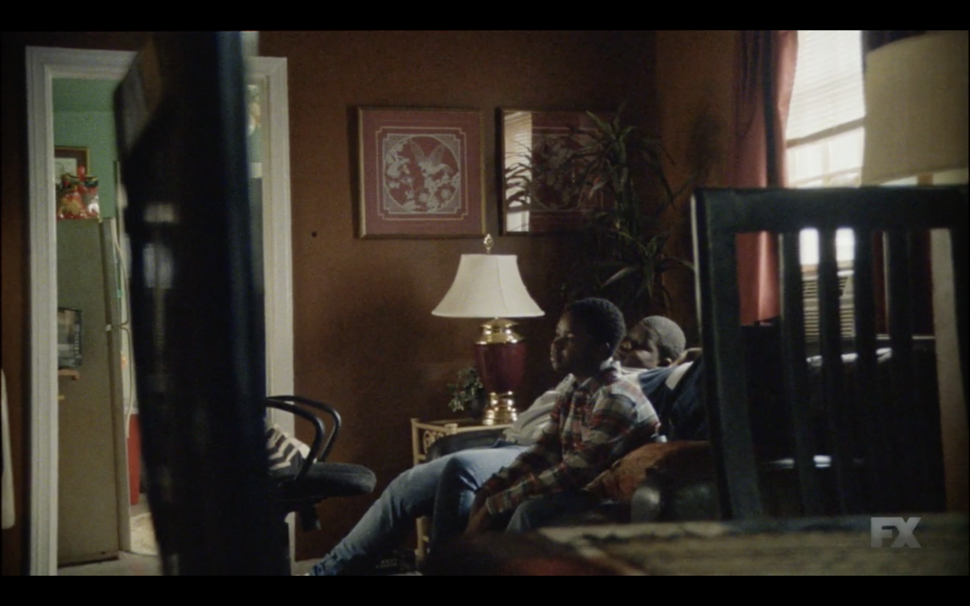
In another part of the school, Paper Boi is living his best adolescent life. He’s a cool kid. He’s in the principal’s office for stealing a calculator from a peer and then selling it back to the same student. He goes on to tell Young Earn to be confident and saves him from years of bullying. After hearing the news about Devin, Paper Boi listens silently as his mother tells him and Earn to look out for one another. No matter what. It’s a moment that brings the Earn-Alfred dynamic full circle for viewers.
Taryn: I applaud Alfred for always being about his bread.
Julia: ALWAYSSSSSSSS. That hustler’s spirit is tried and it is true.
Taryn: A hustler from the start. The fact that he stole this boy’s calculator, sold it back to him and evaded trouble is inspiring.
Julia: This could be a reach but it speaks to how smart dope boys are to me.
Taryn: Dope boys are smart af. Quick on their feet and good at math. No reach there at all. Earn, though book smart, is the opposite and would’ve got caught up if it weren’t for his cousin.
Julia: Al been looking out for that boy his whole life. I’d be exhausted to, especially when it’s a parasitic relationship. Al had to tell Earn to be confident and just say the jersey is real. Earn heard that but didn’t apply it (another thing that hasn’t changed). Then Al still had to swoop in and say it was a real jersey, because Earn, once again, wasn’t gonna stand up for himself. It drives home what Paper Boi said in Episode 2: “Money is an idea, man. There’s a reason why a white man dressed just like you can walk into a bank and get a loan and you can’t even spend a $100 bill.”
Paper Boi been telling him forever that while he needs and should have money, purely stuntin won’t fix his issues. Confidence will. Earn hard-headed.
Taryn: WHEW! Still a bop. I might put that quote on a shirt. Ultimately, Al carried the burden of Devin’s suicide heavier than Earn. You can tell in the final scene how much it weighed on him as he sat in the chair quiet as his mom and aunt talked to Earn. After hearing about the bullying, they told them to look after each other cause that’s what family does. The thing they don’t know is that Al been doing that. Earn hasn’t and probably doesn’t know how. Earn would find solutions to his problems easier if he’d just stop always thinking of himself as a victim.
Julia: That final scene of them sitting beside each other was heavy. “You and your cousin gotta look out for each other.” That showed that this toxic dynamic was bestowed upon Paper Boi even though he had already taken it upon himself to do it anyway. It was an ordainment. A heavy familial obligation put onto Al early. It reminded me of last episode ― and I don’t think we talked about it ― but one thing that stood out to me in Paper Boi’s semi-firing of Earn was when he said, “I need shit. Lotte need shit. You need shit.” Al has been doing this and he’s going to continue doing it once Earn gets out the way so he can do it peacefully.
And I just noticed that they were sitting beside each other much in the same way as kids. Earn was sitting up, Al leaned back. Same as in “North of the Border.” Only in this one they sat closer together, which makes it clear that this disconnect hasn’t always been there.
Taryn: Wow. Symbolism on 10. I wonder what will happen to Earn without Paper Boi. You think he’ll finally get his shit together?
If you or someone you know needs help, call 1-800-273-8255 for the National Suicide Prevention Lifeline. You can also text HOME to 741-741 for free, 24-hour support from the Crisis Text Line. Outside of the U.S., please visit the International Association for Suicide Prevention for a database of resources.
[ad_2]
Source link

